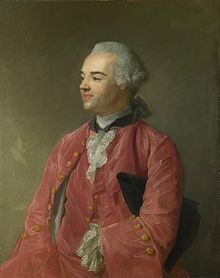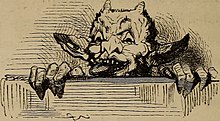 Title page of Jacques Cazotte's The Devil in Love, 1772 Title page of Jacques Cazotte's The Devil in Love, 1772 | |
| Author | Jacques Cazotte |
|---|---|
| Original title | Le Diable amoureux |
| Translator | Judith Landry |
| Language | French |
| Genre | novel |
| Published | 1772 (French) 1793 (English) |
| Publication place | France |

The Devil in Love (French: Le Diable amoureux, 1772) is an occult romance by Jacques Cazotte which tells of a demon, or devil, who falls in love with a young Spanish nobleman named Don Alvaro, an amateur human dabbler, and attempts, in the guise of a young woman, to win his affections.
French critic P.G. Castex has described The Devil In Love as "the very initiator of the modern fantasy story".
Canadian critic Carlo Testa has described The Devil In Love (in review of Stephen Sartarelli's 1993 translation) as a "terminus a quo" in the history of the demonic subgenre".
The Le Diable amoureux started a literary style known as fantastique, where surreal events intrude on reality and the reader is left guessing whether the events actually occurred or were merely the product of the character's imagination.
Plot


Don Alvaro, a young but wise man, invokes Satan. Upon seeing the young Alvaro, Satan falls in love with him and assumes the appearance of a young woman, Biondetta. He follows Alvaro as his page. In the journey that unfolds, Satan, disguised as a woman, tries to seduce Alvaro who rejects his advances lest he lose his virginity. He is unwilling to compromise his honor by sleeping with a woman before they are married and he will first need his mother’s approval of the union.
Over the course of their journey, Biondetta (the devil's name as a woman) and Alvaro will grow closer and closer. When the protagonist's friend Olympia discovers that Alvaro's "male" servant is in fact of the female sex, she confronts Alvaro, who denies the accusations and sides with his servant. Thereafter, Biondetta abandons her life as servant and proceeds to get closer and closer to Alvaro, surviving an assassination attempt by Olympia. The devil tries to have sex with Alvaro, before their wedding or Alvaro's mother's blessings, but is rebuffed by Alvaro. Biondetta then takes leave, never to be found again. Alvaro returns to his family's court, where his mother consoles him that it was all a bad dream. His mother reminds him that if he had listened to her he would never have fallen victim to the devil.
Reception
The novel would prove influential on Jacques Lacan who encountered it as part of a symposium on Jacques Cazotte. Lacan would adapt one scene from the story, in which the devil first appears and asks Alvaro "che vuoi?" (What do you want? in Italian). Lacan incorporated this into the graph of desire, arguing that one must ask oneself over and over again what the big Other "truly wants".
Adaptations
- 1840: Le Diable amoureux, France, a ballet by Napoléon Henri Reber, François Benoist and balletmaster Joseph Mazilier. It was later restaged in a revised version under the title Satanella by the Marius Petipa with his father Jean Petipa for the Imperial Ballet with the original music re-orchestrated by Konstantin Liadov. This revival premiered on February 10, 1848 at the Bolshoi Kamenny Theatre in St. Petersburg, Russia.
- 1858: "Satanella, or The Power of Love", Romantic Opera in Four Acts by Michael William Balfe.
- 1929: Le Diable amoureux, France, a comic opera by Alexis Roland-Manuel.
- 1975–1989: Devil in Love (Vlyublyonny dyavol), Russia, an opera in two acts by Alexander Vustin, libretto by Vladimir Khachaturov.
- 1993: The Club Dumas (El Club Dumas), Spain, a novel by Arturo Pérez-Reverte inspired by and that refers to the novel.
- 1999: The Ninth Gate, United States, a film directed by Roman Polanski, starring Johnny Depp, is a partial adaptation of The Club Dumas.
- 2010: "The Devil in Love - A Soundtrack to the 1772 Occult Novel", a double-CD compilation with contributions from The Tiger Lillies, Jarboe, John Zorn, Art Zoyd and other artists; issued with a Swedish translation of the novel published by Malört Förlag.
References
- "Vintage Pop Fictions: The Devil in Love, by Jacques Cazotte". vintagepopfictions.blogspot.co.uk. Retrieved 2016-01-22.
- Castex quoted in Franz Rottensteiner, The Fantasy Book:an illustrated history from Dracula to Tolkien. Collier Books, 1978, (p. 137). ISBN 0-02-053560-0
- Testa, Carlo (Spring–Summer 1994). "Reviewed Work: The Devil in Love by Jacques Cazotte, Stephen Sartarelli". Nineteenth-Century French Studies. JSTOR 23537155.
- E. von Mücke, Dorothea (2003). The Seduction of the Occult and the Rise of the Fantastic Tale. Stanford University Press. p. 304. ISBN 9780804738606.
- "Vintage Pop Fictions: The Devil in Love, by Jacques Cazotte". vintagepopfictions.blogspot.co.uk. Retrieved 2016-01-22.
- O, Nancy (December 13, 2015). "Che vuoi? That is the question: The Devil in Love, by Jacques Cazotte". oddly weird fiction. Retrieved January 8, 2024.
- Tomalonis, Alexandra (January 26, 1990). "Dance". The Washington Post. Retrieved January 8, 2024.
- Walsh, Basil (2008). "Michael William Balfe". britishandirishworld.com. Retrieved January 8, 2024.
- "Roland Manuel, Roland Alexis Manuel Levy, dit (1891-1966)". Cimetière du Père Lachaise. October 13, 2023. Retrieved January 8, 2024.
- "Alexander Vustin "The Devil in Love" opera in two acts". OperaAndBallet.Com. April 7, 2019. Retrieved January 8, 2024.
- "The Club Dumas". Kirkus Reviews. May 19, 2010. Retrieved January 8, 2024.
- Corbett, Bob (August 2015). "The Club Dumas". Bob Corbett. Retrieved January 8, 2024.
- "The Devil in Love: A Soundtrack to the 1772 Occult Novel". MusicBrainz. Retrieved January 8, 2024.
External links
- Le Diable amoureux at the Association des Bibliophiles Universels (in French)
- Le Diable amoureux at the Internet Archive (in French) (illustrated)
This article about a gothic novel of the 18th century is a stub. You can help Misplaced Pages by expanding it. See guidelines for writing about novels. Further suggestions might be found on the article's talk page. |